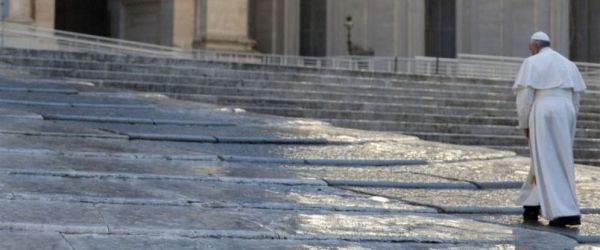In the Gospel for today’s Liturgy, Jesus continues preaching to the people who had seen the prodigy of the multiplication of the loaves. And he invites those people to make a qualitative leap: after having recalled the manna with which God had fed the forefathers in the long journey through the desert, he now applies the symbol of the bread to himself. He states clearly: “I am the bread of life” (Jn 6:48).
What does bread of life mean? We need bread to live. Those who are hungry do not ask for refined and expensive food, they ask for bread. Those who are unemployed do not ask for enormous wages, but the “bread” of employment. Jesus reveals himself as bread, that is, the essential, what is necessary for everyday life; without Him it does not work. Not one bread among many others, but the bread of life. In other words, without him, rather than living, we get by: because he alone nourishes the soul; he alone forgives us from that evil that we cannot overcome on our own; he alone makes us feel loved even if everyone else disappoints us; he alone gives us the strength to love and, he alone gives us the strength to forgive in difficulties; he alone gives that peace to the heart that it is searching for; he alone gives eternal life when life here on earth ends. He is the essential bread of life
I am the bread of life, He says. Let us pause on this beautiful image of Jesus. He could have offered a rationale, a demonstration, but – we know – Jesus speaks in parables, and in this expression: “I am the bread of life”, he truly sums up his entire being and mission. This will be seen completely at the end, at the Last Supper. Jesus knows that the Father is asking him not only to give food to people, but to give himself, to break himself, his own life, his own flesh, his own heart so that we might have life. These words of the Lord reawaken in us our amazement for the gift of the Eucharist. No one in this world, as much they might love another person, can make themselves become food for them. God did so, and does so, for us. Let us renew this amazement. Let us do so as we adore the Bread of Life, because adoration fills life with amazement.
In the Gospel, however, rather than being amazed, the people are scandalized, they rend their clothing. They think: “We know this Jesus, we know his family. How can he say,’ I am the bread which came down from heaven’?” (cf. vv. 41-42). Perhaps we too might be scandalized: it might make us more comfortable to have a God who stays in heaven without getting involved in our life, while we can manage matters here on earth. Instead, God became man to enter into the concrete reality of this world; to enter into our concrete reality, God became mand for me, for you, for all of us, in order to enter into our life. And He is interested in every aspect of our life. We can tell him about what we are feeling, our work, our day, our heartache, our anguish, so many things. We can tell Him everything because Jesus wants this intimacy with us. What does he not want? To be relegated to being considered a side dish – he who is Bread –, to be overlooked and set aside, or called on only when we need him.
I am the bread of life. At least once a day we find ourselves eating together; perhaps in the evening with our family, after a day of work or study. It would be lovely, before breaking bread, to invite Jesus, the bread of Life, to ask him simply to bless what we have done and what we have failed to do. Let us invite him into our home; let us pray in a “homey” style. Jesus will be at the table with us and we will be fed by a greater love.
May the Virgin Mary, in whom the Word became flesh, help us to grow day after day in friendship with Jesus, the bread of Life.
[Pope Francis, Angelus 8 August 2021]












